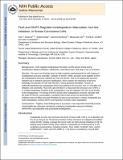Tks5 and SHIP2 Regulate Invadopodium Maturation, but Not Initiation, in Breast Carcinoma Cells
Author(s)
Sharma, Ved P.; Eddy, Robert; Entenberg, David; Condeelis, John; Kai, Masayuki; Gertler, Frank; ... Show more Show less
DownloadGertler_Tks5 and ship2.pdf (5.047Mb)
PUBLISHER_CC
Publisher with Creative Commons License
Creative Commons Attribution
Terms of use
Metadata
Show full item recordAbstract
Background: Tks5 regulates invadopodium formation, but the precise timing during invadopodium lifetime (initiation, stabilization, maturation) when Tks5 plays a role is not known.
Results: We report new findings based on high-resolution spatiotemporal live-cell imaging of invadopodium precursor assembly. Cortactin, N-WASP, cofilin, and actin arrive together to form the invadopodium precursor, followed by Tks5 recruitment. Tks5 is not required for precursor initiation but is needed for precursor stabilization, which requires the interaction of the phox homology (PX) domain of Tks5 with PI(3,4)P[subscript 2]. During precursor formation, PI(3,4)P[subscript 2] is uniformly distributed but subsequently starts accumulating at the precursor core 3–4 min after core initiation, and conversely, PI(3,4,5)P[subscript 3] gets enriched in a ring around the precursor core. SHIP2, a 5′-inositol phosphatase, localizes at the invadopodium core and regulates PI(3,4)P[subscript 2] levels locally at the invadopodium. The timing of SHIP2 arrival at the invadopodium precursor coincides with the onset of PI(3,4)P[subscript 2] accumulation. Consistent with its late arrival, we found that SHIP2 inhibition does not affect precursor formation but does cause decreases in mature invadopodia and matrix degradation, whereas SHIP2 overexpression increases matrix degradation.
Conclusions: Together, these findings lead us to propose a new sequential model that provides novel insights into molecular mechanisms underlying invadopodium precursor initiation, stabilization, and maturation into a functional invadopodium.
Date issued
2013-10Department
Massachusetts Institute of Technology. Department of Biology; Koch Institute for Integrative Cancer Research at MITJournal
Current Biology
Publisher
Elsevier
Citation
Sharma, Ved P. et al. “Tks5 and SHIP2 Regulate Invadopodium Maturation, but Not Initiation, in Breast Carcinoma Cells.” Current Biology 23.21 (2013): 2079–2089.
Version: Author's final manuscript
ISSN
0960-9822
1879-0445